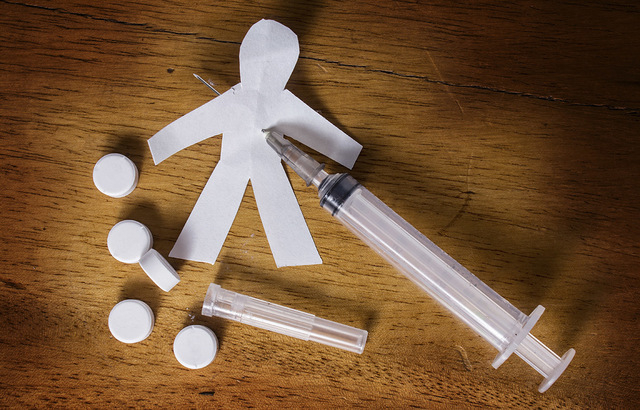Law enforcement agencies combine efforts to keep Las Vegas mail system drug-free
Movies often portray illegal drugs being smuggled in hidden compartments, swallowed in balloons, taped to people under bulky clothing or flown in small planes so low they go under the radar. Why don’t we ever see them just being mailed? Probably because it isn’t easy to do.
“We have two interdiction teams, one in the north and one in the south,” said Keith Carter, director of the Federal High Intensity Drug Trafficking Area program in Nevada. “Trying to keep drugs from being delivered through the mail is part of their duties. They’re not that hard to find.”
Not that that deters people.
“It’s not small amounts,” Carter said. “People try to ship all kinds of drugs, even marijuana. You can stand there and smell it. They ship 10, 15 (pounds), and even 50-pound packages of weed aren’t uncommon. Two years ago, we had an organization that was doing all of their drug deliveries, both local and out-of-state, through the mail. We worked the group for about a year before dismantling them. ”
HIDTA is a federal program that provides assistance to federal, state, local, and tribal law enforcement agencies operating in areas determined to be critical drug-trafficking regions of the United States. Carter declined to elaborate on the organization’s investigative methods but noted that the group goes to federal and privately owned mail distribution points along with mom-and-pop mailbox stores to do suspicious package checks.
“Anything to do with the mail is a federal case,” said Nevada-based postal inspector Andrea Avery. “No one can open U.S. mail without a search warrant and a postal inspector on hand. We have investigative methods we can’t share, but sometimes our information comes from a tip or good, old-fashioned investigation.”
The charge for shipping drugs through the mail varies, depending of the amount and type of drug being shipped. Avery cited several specific laws relating to shipping drugs and another for shipping non-mailable items. Postal inspectors work with the federal Drug Enforcement Administration, the FBI, Homeland Security and other agencies to prevent drugs from being shipped.
“We want to take illicit drugs and the money from the sale of illicit drugs out of the mail,” Avery said. “We want to preserve the integrity of the mail and and provide a safe environment for the employees and customers.”
While Avery noted that the southwest part of the country is more of a source for illegal drug shipments than other parts of the country, the practice isn’t epidemic. A former organized crime figure confirmed that large organizations don’t use the mail because the risk versus reward is too high.
“Sending drugs through the mail is specialized,” Carter said. “I don’t know if it’s going up or down, but it’s happening. We probably find something every week, if not every day.”
One thing that complicates the issue is people sending prescription drugs through the mail who are unaware that it is illegal to ship prescription drugs unless it’s through a pharmacy.
“If you receive a package in the mail you weren’t expecting, don’t try to open it,” Avery said. “If you know of anyone shipping drugs through the mail, call our toll-free number: 877-876-2455.”
For more information, visit tinyurl.com/jzvp2ff.
To reach East Valley View reporter F. Andrew Taylor, email ataylor@viewnews.com or call 702-380-4532.
Report suspicious packages
Anyone receiving an unexpected and/or suspicious package in the mail is asked to report it by calling 877-876-2455.
For more information, visit tinyurl.com/jzvp2ff.




























